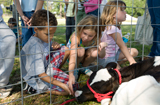Developing Agritourism
Florida is one of the nation's top 10 most productive agricultural states, but small and medium-sized agricultural businesses face challenges from competition with industrial agriculture, high business expenses, and low commodity prices.
Many farmers are now incorporating tourism into their operations to draw visitors to their farm and earn an alternate source of income (this practice is called "agritourism" or "agritainment"). However, tourism requires different business management than normal agriculture. Here are some ideas on how to get started on your farm.
Why Consider Agritourism?
As an agricultural producer, you might consider adding an agritourism aspect to your farm for several reasons:
- Farm tourism is a new cash crop in the U.S. Studies have found that a significant number of Americans are spending money to visit and participate in recreational activities on farms.
- Agritourism benefits the environment and wildlife. Wildlife-oriented agritourism (e.g., wildlife photography, bird watching, and fishing) requires managing land for wildlife. Federal and non-profit groups can even provide economic incentives for setting land aside for conservation.
- Agritourism provides social benefits to local communities. Agritourism lets you educate others about agriculture; school groups often take trips to local agritourism operations. Agritourism also enables you to use direct marketing, which promotes local sustainable markets.
Any business has pros and cons, and you need to be aware of them before starting your agritourism venture. Typical pros of agritourism include promoting your farm products and farming in general, while potentially increasing sales. Cons usually include managing visitors, risk of liability for accidents, marketing problems, theft, and a poor location.
Develop a Plan
Tourism usually supplements existing farm operations, so start small and build up as needed. Consider the following points when planning an agritourism program at your farm:
- Identify goals. Determine why you want to start an agritourism operation and what benefits you hope to get from it.
- Understand surrounding tourism operations. Find a way to collaborate, rather than compete, with other local attractions.
- Create a business plan. Plan the development and execution of your operation, including your mission, goals, financial needs, resource assessment, and strategies.
- Identify your market. You need to define your market in order to effectively attract customers.
- Understand legal issues and purchase liability insurance. Anytime a landowner allows visitors on his or her property, the landowner needs protection from potential lawsuits.
- Plan how to manage visitors. You will need to develop a strategy to manage visitors on your farm and organize activity areas.
- Use "Limits of Acceptable Change." Determine how much impact from human activity is acceptable and how will you keep it within that limit.
- Evaluate costs and benefits. Careful monitoring of finances, visitor experience, and environmental impacts is needed to maintain the quality of your agritourism operation.
Agritourism Opportunities
Traditional agritourism opportunities include horseback riding, U-pick fields, and bed-and-breakfasts, but many farmers have come up with other ideas:
- Corn mazes
- Farm tours
- Farm museums
- Seasonal or holiday festivals
- Nature trails
- Hay rides
- Fee hunting or fishing
- Camping
- Corporate picnics
- Farm zoos
- School field trips
Producing a distinctive experience helps increase the success of your operation. This includes the tourism opportunity itself, any special services (e.g., facilities, educational signs, parking, newsletters, T-shirts), and the atmosphere you and your staff create.
For more information on starting an agritourism operation, visit the Tourism section of the Small Farms & Alternative Enterprises website.
Adapted and excerpted from:
N. McKenzie and A. Wysocki, Agritainment: A Viable Option for Florida Producers (RM008), Food and Resource Economics Department (rev. 10/2008).
W. Francesconi and T. Stein, Expanding Florida's Farming Business to Incorporate Tourism (FOR187), School of Forest Resources and Conservation (rev. 02/2011).

Related Sites & Articles
- Hot Topics
- Alternative Farm Enterprises
- Community Supported Agriculture
- Starting a Farmers Market
- UF/IFAS Publications
- Expanding Florida's Farming Business to Incorporate Tourism
- Fee Fishing in Florida
- Keys to Successfully Choosing Enterprises That Suit Your Small Farm
- Nature-Based Tourism in Florida: Letting Nature Work for You
- Wildlife and Hunting as Alternative Farm Enterprises
- UF/IFAS Sites
- Tourism--Small Farms & Alternative Enterprises

